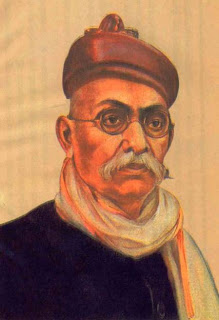Why the Human Birth - Hemadpant
(Note: This is English translation of my earlier Marathi post titled नरजन्माचें काय कारण?)
It was really sad to learn about the demise of Darasinghji. Every Indian heart grieved. But then death does inevitably come to every jeeva does it not? Hemadpant discusses this very fact in the 43rd chapter of the Shreesaisachcharit.
Every birth is followed by death. The two are inseparable. Death is a state natural to the jeeva. Life is what is unnatural to it. - (chapter 43 verse 52)
Death is a state natural to the jeeva. Death is a state that is pleasurable for the jeeva. Life is the unnatural and altered state. – a fact the thinkers and the wise will confirm. - (chapter 43 verse 56)
But if that is how it is, 'what then is the purpose behind our birth in this world' is the question that could and does indeed come up for us. When it comes down to an appraisal of the life lived, 'what did I achieve?' is inevitably the issue. Hemadpant guides us to explain 'why at all the human birth?'
Where have we come from? Who are we? What is the reason behind our human birth? The one who knows the essence, the crux of this, is the wise one. The life of those who do not, ends up as pointless exercise. - (chapter 8 verse 16)
If lasting happiness and contentment are the only objectives in the heart, if the Bhagwanta is the only one we see in all creation, we surely have values that lead us to the supreme, the ultimate fulfillment. - (chapter 8 verse 31)
Further, Hemadpant goes on to explain how we ought to put the human body to use and how we ought not.
If life is used up or spent merely over food, sleep, and other such sensory pleasures, how does the human being differ from the dog or any other beast for that matter? We must give this a thought, we must use the 'vivek' (our ability to discern the right from the wrong) and take the right decision. - (chapter 8 verse 12)
Do not allow the body and the sensory pleasures to rule over you. You have to be in command of the body and not the other way round. Do not indulge or give in to the undue demands of the body. Do not pamper it, for if that happens you will only end up throwing open the gates of hell for yourself. - (chapter 8 verse 33)
Hemadpant then goes on to voice his earnest concern:
The Ishvar was very happy that He had created the human body. His main intention was that the human being would, committed to his ability to discern between the right and wrong along with His ability to turn his focus and attention inwards(towards the Bhagavanta), sing the glories of the bhagavanta, i.e. keep coming closer to the Bhagavanta. - (chapter 8 verse 52)
Though finite and mortal, man is the only being in the creation equipped with a body – a means so appropriate to offer and commit in sadhana and attain the infinite, the immortal Narayan. - (chapter 43 verse 53)
Hemadpant then makes an appeal to us:
Strive for and towards the knowledge of the True Self while your body is still able. Do not squander a single moment of this worthy and precious human birth. - (chapter 8 verse 78)
And what did Hemadpant do in order that not a single moment of "his human birth" be squandered? He made the following request to Shree Sainath:
I am but a server of Your Feet O Sainath! Please do not dishearten me. (please grant me this request). As long as there is life in my body and until there is breath in it, please use it to serve the purpose of Your cause and mission. - (chapter 3 verse 40)
Ordinary bhaktas that we are, we might wonder how Hemadpant could make this wonderful and actually supreme request. The answer comes from Hemadpant himself in the 40th chapter.
The heart, the mind ardently longed, craved for Sai and this was a willful and ceaseless exercise. Despite the intimacy of seven years that he shared with Sainath, Hemadpant did yearn (आस) for Sai to visit his home and have a meal with him and did not dismiss what he saw treating it as a mere dream or illusion (भास). For him, it was the truth, he trusted it.
(ध्यानीं मनीं साईचा ध्यास l हा तो निरंतराचा अभ्यास l सात वर्षांचा जरी सहवास l आंस न भासभोजनाचा ll ) - (chapter 40 verse 119)
Hemadpant's longing for Sai was a ceaseless and constant activity – during this birth and even during his earlier ones and so forever. It was for Sai and Sai alone that he craved for every single moment. That Sainath come to his home for a meal was his intense desire and so his dream could never have been a mere illusion. It was the truth. Indeed the path paved by Hemadpant is the path that every Sai bhakta walks.
ll Hari Om ll

